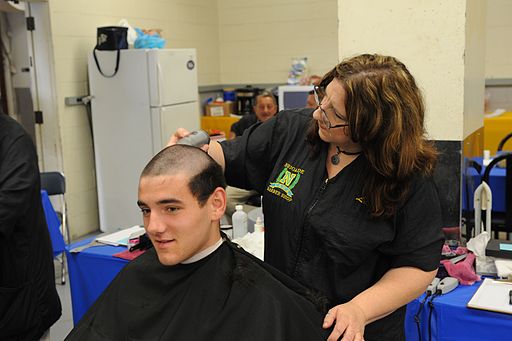Don’t Scalp It If You Can Help It

Tim Corcio, member of the U.S. Naval Academy’s incoming Class of 2019, gets his first military haircut on Induction Day, July 1, 2015. Induction Day marks the beginning of Plebe Summer, the six week indoctrination that transitions civilian students to military life; U.S. Navy photo by Mass Communications Specialist 2nd Class Nathan Wilkes.
Roger Cook from This Old House talks about seasonal mower height settings.
Personal preferences aside, the cool season grasses which predominate in lawns in the northern two thirds of the country really should be mowed at a height of two to three inches at least for the health of the grass and the appearance and lushness of the lawn. The warm season grasses which predominate in the South can be mowed shorter, at about one to two inches, though St. Augustine grass should be mowed higher than that. Regardless of North or South, a good rule to follow is to start with a short mowing height at the beginning of the season, increase the height as temperatures increase, and then lower the height again going into autumn. The worst mistake people inflict on their lawns is to keep the mower at a short height throughout the year, and the worst damage occurs then at the hottest part of summer, when grass that is too short burns up in the heat, allowing weeds to proliferate in the gaps.
The late, great philosopher comedian George Carlin riffs on golf courses and cemeteries, two enormous, grassy wastes of real estate in a bit from his 1992 show, Jammin’ in New York. Warning: foul language.
A good thing to consider as you are either out in the heat yourself this summer mowing the grass or paying a service to do it for you, is how much lawn you really need and whether what you have is enough, or too much of a good thing, also known as a maintenance headache. Plenty of time to think out there. There is just about no entity other than a snooty neighborhood association or nosy, indignant neighbor that will blame you for turning over some or all of your lawn to garden bed or some kind of no mow alternative. The critters will love you for it. You yourself may enjoy more free time away from a fume-belching mower or the few extra dollars in your pocket saved by not hiring out the work to a lawn service. Of course, the increased garden bed space will require some more time for weeding. It’s a trade-off, though not necessarily one that doesn’t benefit you in the long run. Whatever grass you keep, let it grow so that you can feel it between your toes.
― Izzy 
